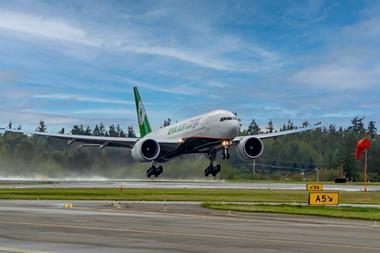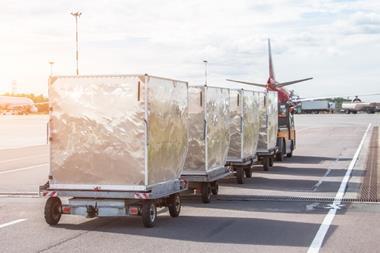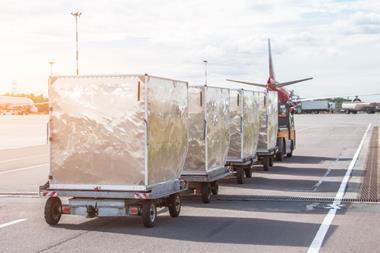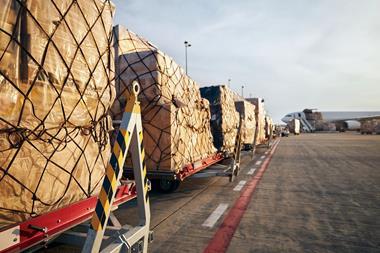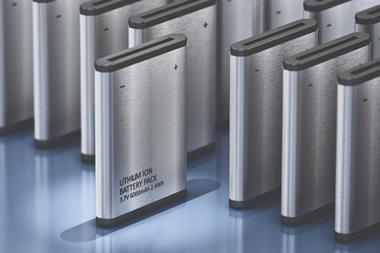As a global trade gateway, with two freighter-owning passenger airlines based in the UAE, it was appropriate to have a panel discussion at WCS17 in Abu Dhabi on the air cargo opportunities and challenges facing a key airfreight transit hub.
Farook al Zeer, managing director of Schenker in the region, said that issues with Customs in some parts of the Middle East were one area of concern, making it clear that the UAE was not a culprit: “While it may take five minutes to have customs clearance here, it could take three to four days elsewhere.”
He made the further point that it was the responsibility of the Gulf Cooperation Council to make sure that improvements were made in terms of customs process consistency across the region in order to grow air cargo volumes and to generate income.
David Hoppin, chief executive of Diio, a business intelligence company, pointed to a regional competitor country, saying that Saudi Arabia was “waking up” with investment in its aircraft fleet and airport capability.
Hopping, repeating the old adage that Emirates was the national carrier of India, also observed that UAE trade partner India was going through a government-led change that could see a reduction in bureaucratic procedures and other obstacles to aviation, bringing with it increased competition for air cargo services.
David Kerr, senior vice president cargo for Abu Dhabi-based UAE national carrier Etihad Airways, said that obstacles were “part of the opportunity” for airlines in a world where consumers want their products delivered next day and that this presented positives for transit hubs, such as in the UAE.
He later made the point that Etihad is investing in specialist equipment in transporting horses on freighters, saying that this vital and popular sport in the UAE had given “a clear mandate for this [cargo] product”.
Nadia Abdul Aziz, president of the National Association for Freight and Logistics (NAFL), said that progress had been made on the customs clearance issue, while other aspects, such as good facilities for truck drivers, were still lagging behind.
She added that the GCC rail network of the future will bring down connection times within the region to a couple of hours for some key points.
Asked by the panel moderator Nick Careen of IATA what were the obstacles to increase speed within the air cargo supply chain, Hoppin spoke of the “elephant in the room”, referring to the freight forwarding industry “which does not tend to be overly transparent” in its processes.
For the NAFL president it was about staff training, adding that younger people entering the industry are “more adaptive and IT savvy” than their older colleagues, and have the ability to “learn very fast”.
She made the point that the UAE government is pushing for “smart solutions” for industry, with significant investment in innovation, research and development, although this may not currently be matched by the private sector.
Kerr of Etihad said that investment in transporting temperature-sensitive pharma goods was in response to an “increasingly more complex market” although there was keen competition among carriers in this niche sector which meant that the industry had to be wary of commoditisation: “We need a careful balance”.
There was an important role for the freight forwarder community in this sector, added Kerr, to provide the scale and consolidations to aggregate volumes.
Al Zeer praised the role of hub airports and said that the industry in the region needed to look beyond pharma and perishables, to such sectors as aerospace, where specialist expertise would be “better for the airlines, the freight forwarders, the people and the country”.
The session was brought to an end with Careen asking what would the panellists change in the air cargo industry?
For Abdul Aziz, it was the introduction of a standardised global system for clearing goods, whether in the UAE, the US or Asia. It would reduce costs, make the life of the freight forwarder that much easier in terms of staff training and add transparency to the supply chain.
For Hoppin, it was better forecasting and less emphasis on traditional gateways, allowing for new gateways to take advantage of the growth in bellyhold cargo.
Kerr wanted to have better data infrastructure: “It is senseless to move around paper, it is a waste of energy and money.”
Al Zeer echoed the need for a community system, with one platform for cargo, from the shipper consignee, bringing increased transparency.





